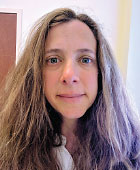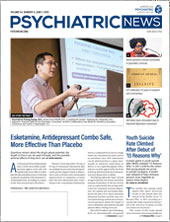As a child and adolescent psychiatrist, I spend a fair amount of time helping kids “talk back” to their anxiety. I even have developed a way to help them understand what I mean: “Give your anxiety-monster a hug, tell it thank you for trying to keep you safe, and then let it know you don’t need it. You are OK.” It helps to help kids recognize that anxiety is ultimately here to protect us, not harm us, but sometimes it is on overdrive. One way to address the problem and teach them that taking back control is important is to talk through examples of when their anxiety is trying to help but instead prevents them from taking a desired action, such as approaching peers during recess and asking them to play, taking a test, trying something new—the list goes on.
I know how anxiety works. I have dealt with it most of my life and pride myself on being able to talk myself down, control the autonomic system, rebalance, and face what scares me. In other words, I talk back to my anxiety-monster.
But what if my anxiety is not irrational? This is the problem I now face. I am overcome with near-impairing-yet-appropriate anxiety about our climate and the wreck of a future we are leaving for our children and theirs. This is what our amygdalae were meant to do: Alert us to real threats to our survival. Since mine is doing its job, I cannot use cognitive-behavioral therapy (CBT) or exposure to lessen this emotional state. I cannot take medicine to mitigate the appropriate response.
So, what to do? I cannot continue to live with this level of catecholamines contaminating my system, nor can I pretend that I am overreacting and that my anxiety-monster is wrong. Further, I truly believe my anxiety is trying to protect me against the learned helplessness and hopelessness of eco-depression. Depression regarding climate change is a dangerous path, as it can lead to acceptance of all the terribleness that may happen if we, as a people, do nothing.
And how do I help my patients and my children address climate-related fears? Surveys report that more than 50% of children are anxious about their future because of climate destruction, with many reporting it keeps them up at night. Thus, it is likely that my kids and patients are thinking about climate change. Do I raise the issue or not? A problem with discussing this in session is that our field is not prepared for the realities of climate change. Our practice models and theories do not address eco-anxiety and eco-despair without somehow first dismissing it.
The closest model we have is the grieving parent. But that assumes a gravity that is either inevitable or already present. This is not inaccurate, as some climate disasters are already here (fires, floods, droughts, wars, migration), and others will occur no matter how swift or sweeping our actions. But it seems dangerous to go the route of hopeless mourning, to fully give in to the despair, as it excuses us from the more challenging path of change.
So how do we, as healers, treat not a personal illness but a societal one (of denial, greed, and addiction to fossil fuels)? We need to come together, as responsible clinicians, to address our climate situation. More specifically, pediatricians owe it to our patients to stop ignoring this issue. It is our job to protect children. To steal from another important topic: “This is our lane.” But we seem, like the rest of society, to choose blindness over difficult and necessary work.
I have no solutions on how to help our patients with climate anxiety. I do question using CBT or analysis—treating their emotions as an illness—rather than stepping back and recognizing their emotions are appropriate symptoms of a real societal problem. We need to help patients learn how to acknowledge their amygdalae and use their voices to advocate for change, while also helping them to accept and grieve for the parts of our environment that we can no longer save. But first we need to do this for ourselves. ■

